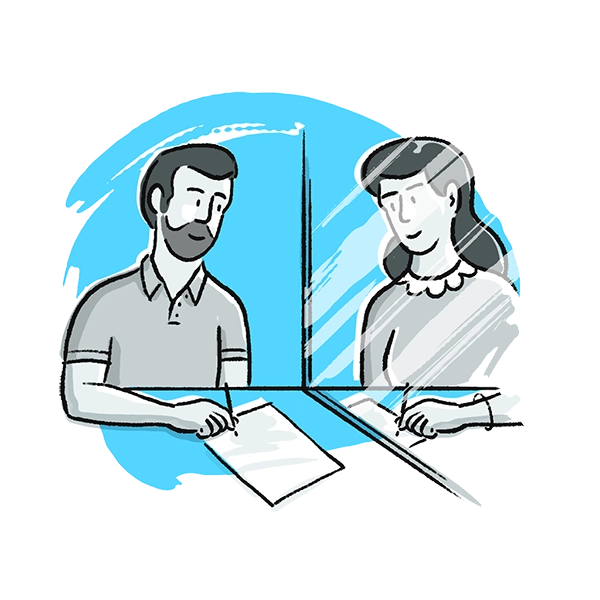Guide to Wills
Writing a will can be a daunting task, but our specialists are here to make it feel simple. In this guide, you’ll find everything you need to know about making a will online.

Writing a will can be a daunting task, but our specialists are here to make it feel simple. In this guide, you’ll find everything you need to know about making a will online.

Part 1
Ultimately, all of us will die. It might not be today or tomorrow, but we know it will happen one day. At that time, especially if you have children or dependents, you will want to know that they will be looked after when you are no longer around.
By having a Will, you are able to pass on your assets as you wish to the people you choose to receive them. If you do not have a Will, then your estate will pass in accordance with the intestacy rules and may be distributed in a way you would not want. If you want to ensure that the right people are able to inherit your money and possessions, then you need to make a Will. If you have a partner but are not married or in a civil partnership, then having a Will is even more important because they will not be eligible to inherit your assets under the intestacy rules so could end up with nothing.

Part 2
To explain briefly, Inheritance Tax is a tax that is levied on the estate of someone who has died. Every individual has an allowance called the Nil Rate Band (which is currently £325,000) available before any Inheritance Tax is due. Once the estate exceeds the Nil Rate Band, inheritance tax is charged at 40%.
There are a few methods that can be used to mitigate any liability to inheritance tax. The most common one is to leave your estate to your spouse/civil partner or a charity, both of whom are exempt from the tax. This means that any money you leave to your spouse/civil partner or any charity will be free of tax.
It is also possible to increase the inheritance tax threshold by leaving your home to your children or grandchildren. This allows an additional exemption to be claimed called the Residence Nil Rate Band. This is an additional allowance (currently £175,000) that sits alongside your Nil Rate Band and can be claimed when your entire estate is valued below £2 million. This means that you could have a potential £500,000 free of inheritance tax, and if you are married or in a civil partnership at the time you pass away then it can be carried over when your spouse passes away, meaning that there is a potential £1,000,000 before any inheritance tax is due.
The other way to decrease the impact of inheritance tax on your estate is to leave over 10% of the net value of your estate to charity. In addition to the exemption for the charity gift, this allows the estate to pay Inheritance Tax at 36% instead of 40%.

Part 3
Dying without a Will is known as dying intestate. Without a Will, you have no say in what happens after your death. Instead, your estate – the sum total of all your assets – will be divided as set out under the Intestacy Rules and this will often not be as you would expect or want. If you have children or dependents, you have no guarantee that they will be looked after by the people you wish to be their guardians – indeed parental responsibility will vest with the Local Authority in the first instance and there is a chance that individuals who you wanted to receive some inheritance from you would receive nothing – meaning that there is a chance your children could go into foster care.
Importantly, if you have no close family members then dying intestate is deeply problematic. This is because all of your estate passes to the government, as the rules of intestacy limit inheritance to direct family members, or legally recognised partners in marriage or a civil partnership. This means that even if you wanted to leave your money to a your unmarried partner specific charity, friend, or even a carer, then you will not be able to do so.

Part 4
When you make a Will, you will be faced with one initial choice – what type of Will is right for you?
Every will is different and needs to be tailored to your own individual circumstances. It may be that a simple will is perfectly sufficient for your circumstances or you may have more complicated family arrangements or complicated assets (e.g. a business or overseas assets) that make the drafting of the will more complex to achieve the desired outcome. Kwil are able to assist you from making a simple straightforward will to a bespoke will that incorporates more complex provisions.

Part 5
If you have any specific funeral requests, then it is important to set them out within your Will. If you have no close family members, this can be a good way to ensure that your wishes are carried out after you are gone.
If no direction as to funeral wishes can be found, then your executor will have to make the decision on your behalf, which may not otherwise reflect what you wanted. Some people feel very strongly about a burial or a cremation, and whether they would like a religious or non-religious ceremony and this is the ideal place to state those wishes.
Your executors are able to use your own funds to pay for your funeral but you can also look into taking out a funeral plan to ensure everything is paid and taken care of.

Part 6
When writing your Will, you should make sure to consider any dependents that you have. These are people who rely on your income. This is especially important, as your dependents can legally challenge your Will if they could expect to have reasonable provisions for their futures made for them. You should also remember that your dependents may not be limited to your family, or even your close family. Your dependents could include:
Consider carefully who you regard as dependant on you and whether they would have any hope or expectation in being left a gift or money under the terms of your will.

Part 7
If you have minor children (who are under 18 years) then it is very important that you appoint guardians for them in your will. Guardians will look after your children and have responsibility for them until they are 18. If you do not have guardians, then immediate parental responsibility will be with the Local Authority and it will be up to them to decide who will look after your children. Many people mistakenly believe that the children will automatically be placed with family members, but this is not the case.
When choosing a guardian, it is very important that you choose someone you trust. Most people will leave this duty to their spouse initially, but, if this is either not practical or plausible, it is recommended that you find someone you know can handle the duties of being a guardian. This is often a close family member or family friend. You must discuss this with the person you are nominating as a potential guardian before writing them into your Will. You may also consider whether it would be appropriate to appoint your guardian as a trustee as well to ensure they have a voice in the financial decisions.

Part 8
When writing your Will, it is important to name an executor. The executor is responsible for managing the administration of your estate and obtaining a grant of probate, if required. Once your executor has liquidated or transferred your assets they are then responsible for paying everything out to the beneficiaries.
It is important to nominate at least one executor, and it is often recommended that you name a replacement executor just in case your original executor is unable to act for whatever reason. You need to discuss this with your named executors first, as the duties involved can be onerous and time consuming.
You can choose anyone to act as your Executor as long as they are over 18.

Part 9
The residue is the remainder of your estate after all gifts and liabilities have been met. You can choose to leave it as a percentage, to split it equally/unequally among a set number of individuals or dispose of it however you wish.
All or part of your residuary estate can be given to Charities of your choosing.

Part 10
You should make sure that you store your Will safely and tell your executor and family where you have stored it. If your family and executor cannot find your Will, then your wishes may be ignored. They may even find an earlier Will which had been revoked but not destroyed. This can also be problematic if you have never made a Will before, as this could cause your estate to be divided under intestacy law. Many people store a copy of their Will with either their solicitor or their bank.
This is because these are both institutions that are generally trusted to hold documents safely on your behalf, usually in a manner which is safe from disasters such as a fire.

Part 11
A will must be signed by the testator (the person making the will) in the presence of two independent witnesses who must both watch the testator sign the will at the same time. The witnesses should then sign their names and put their address underneath the signature of the testator. The witnesses must be over 18 and should not be named anywhere else in the will (i.e. they cannot be executors, trustees, guardians or beneficiaries in the will) You should then make sure that the will is dated correctly.

Part 12
If you cannot sign the will due to a physical incapacity, then it can also be signed on your behalf by another person who “stands in” as you. You must be in the in the room at the same time it is signed at your direction. However, you must have the mental capacity to make the will, otherwise the will is invalid. Any will that is signed on your behalf must contain a clause saying you understood the contents of the will before it was signed.
If you have a serious illness or a diagnosis of dementia, you can still make a will, but you need to have the mental capacity to make sure it is valid. It may be worth obtaining a medical practitioner’s statement at the time the will is signed, certifying that you understand what you are signing. This can then be presented if the will is ever challenged later down the line.

Part 13
You should review your will roughly every five years and after any major change in your life such as a new child/grandchild or if you move house.
If you are making a minor amendment to your will, you can add a formal amendment, known as a codicil. This must be signed and witnessed in the same way as the will, although the witnesses don’t have to be the same as the original ones. Never write on your original will as it will invalidate it.
If anything substantial needs to be changed, you should make a new will and cancel your old one.

Part 14
If you should marry or enter a civil partnership, then this will automatically cancel any existing will (unless that existing will was made in contemplation of that marriage). You should make a new will as soon as possible. Divorce does not automatically invalidate a will made during the marriage, but it means that your ex-spouse or civil partner will not be able to benefit if they are mentioned in the will, even if you want them to. It is a good idea to make a new will if you marry, separate or divorce.

Part 15
If someone dies without making a Will then their estate automatically will pass in accordance with the Intestacy Rules. We have listed the main scenarios below:
Married/civil partnership with children: If you are married or are in a civil partnership and you have children, then the rules at the moment state that the first £270,000 will pass to your spouse and any remaining assets will be split in half – your spouse will get one half and your children will share equally the other half. It is important to note that if you want to ensure the financial security of your spouse after you pass away then you will need to make a will ensuring your estate is left outright to them.
Unmarried with children: If you are not married when you pass away then your estate will pass equally to your children.
Unmarried with no children: If you are not married and you have no children then your estate will pass in the following order of priority:
